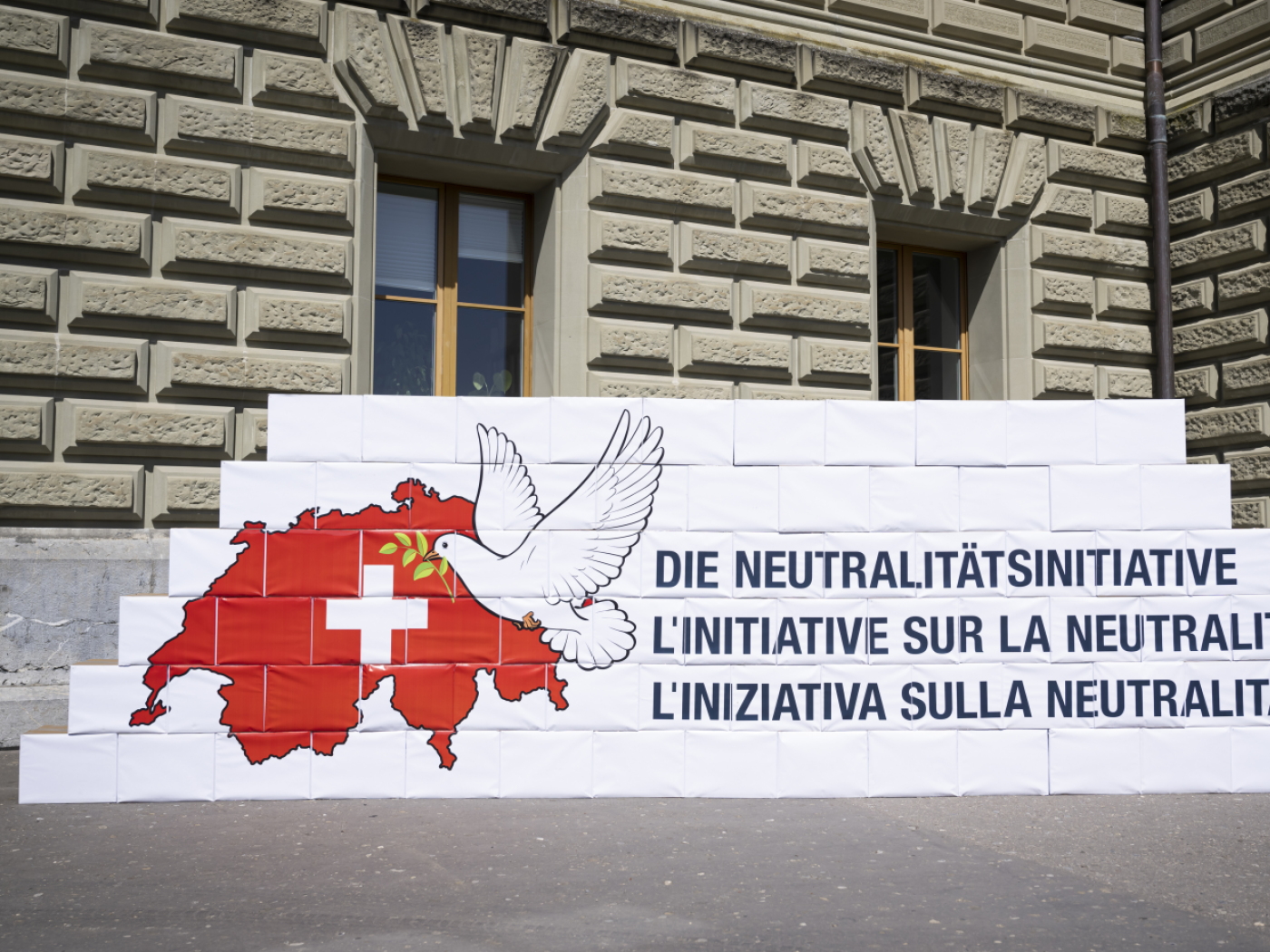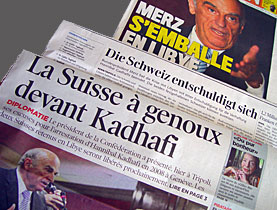
Swiss hostages to leave Libya

Two Swiss detained for more than a year in Libya have received exit visas, nearly a week after a controversial diplomatic mission by Switzerland's president.
Authorities said on Wednesday that the men still needed the permission of Libya’s judicial authorities before they can leave. They confirmed a Swiss government jet had landed in Libya’s capital, Tripoli, on Tuesday.
Swiss President Hans-Rudolf Merz received a written note from the Libyan prime minister, Al-Baghdadi Ali Al-Mahmoudi, on Wednesday assuring him it was “a matter of time” before the men would be allowed out of the country, Merz’s finance ministry said.
In a statement on Wednesday evening, the ministry said a Swiss delegation had met the two men in Tripoli late on Tuesday.
“During the course of the evening, the passports and exit visas were handed over to both of the detainees. The final hurdle is that of obtaining the approval of the justice authorities for the departure,” it said.
The return of the two Swiss businessmen is linked to an agreement Merz signed after a meeting with the Libyan prime minister last Tuesday.
The Swiss president apologised for the “unjustified” arrest of leader Moammar Gaddafi’s son and daughter-in-law in Geneva in July 2008.
The pact between the two countries – Merz signed versions in English and Arabic – prompted an outcry and sparked concerns about violations of national law and rules governing the collective decision-making process of the government.
Tricky politics
The Swiss presidency is a rotating post and the president has a ceremonial role, which does not allow him or her to act without approval from the cabinet’s six other members.
Merz said his visit had resolved the central issue preventing any improvement in relations between Libya and Switzerland, which deteriorated sharply since the arrest.
The cabinet had known about the trip but not about the contents of the agreement, which are now a part of Switzerland’s international obligations to Libya.
Merz returned with assurances from the Libyan prime minister that the businessmen would be released before September 1 – the 40th anniversary of Gaddafi’s bloodless coup. Amnesties are to be granted to a large number of prisoners to mark the occasion.
Merz was widely criticised in Switzerland not only for apologising to Libya, but also for returning without the two men. Many commentators pointed out that the North African state consistently refused to link the detention of the two Swiss with the arrest of Gaddafi’s son, Hannibal.
Had they had gone back with Merz, it would have implied a connection.
Hannibal Gaddafi was arrested in a Geneva hotel by the Geneva police, along with his heavily pregnant wife Aline, on charges of beating two of their servants. They were later released on bail, and left the country.
The servants involved withdrew their complaints, after receiving compensation.
Controversy
In the aftermath of the affair, Tripoli took a number of economic sanctions, including limiting trade and reducing, then stopping, flights between Libya and Switzerland. Swiss businesses were forced to close their offices.
Two Swiss businessmen, one of them employed by the ABB engineering group, were imprisoned on charges of visa violations. Although they were released from jail after just over a week, they were not allowed to leave the country.
In May, Foreign Minister Micheline Calmy-Rey visited the two men during a three-day trip to Libya, to check on their physical and mental health. She was accompanied by the detainees’ wives and a doctor.
The foreign ministry noted “significant progress” but released no details.
The widespread concern and indignation in Switzerland about the detention of the businessmen led some people to accept that Merz’s apology was a necessary evil.
Some critics accused him not only of grovelling before an unreliable authoritarian regime while others attacked him for allegedly violating the sovereignty of canton Geneva, which backed the actions of its police.
Concern has also been expressed that an independent arbitration panel will investigate the incident. Some critics say this undermines Swiss law and its federalist system, which gives the cantons wide-ranging autonomy.
swissinfo.ch
July 15, 2008: Hannibal Gaddafi and his wife Aline are arrested at a Geneva hotel after police receive reports that they have mistreated two servants.
After two nights in detention, the couple are charged with inflicting physical injuries against the servants. The Gaddafis are released on bail and leave Switzerland.
July: Two Swiss nationals are arrested in Libya. Swiss businesses are forced to close their offices and the number of Swiss flights to Tripoli is cut.
July: Bern forms a task force and sends a delegation to Libya. Two Swiss nationals arrested in Libya are released from jail.
August: A Libyan delegation is in Switzerland for talks.
October: Libya cuts its own airline’s flights to Switzerland.
December: Swiss International Air Lines can no longer fly to Tripoli.
January 2009: Talks are held in Davos with Seif al-Islam Gaddafi, one of the Libyan ruler’s sons. A diplomatic delegation travels to Tripoli.
April: Hannibal and his wife, along with the Libyan state, file a civil lawsuit against the Geneva authorities in a Geneva court.
May: Foreign Minister Micheline Calmy-Rey returns from a visit to Libya. She says “significant progress” is made. Efforts are underway to arrange a meeting between President Hans-Rudolf Merz and Libyan leader Moammar Gaddafi.
June: Libya withdraws most of its assets from Swiss bank accounts.
August 20: Merz, who meets the Libyan prime minister but not Gaddafi, apologises in Tripoli for the arrest.
August 26: The Swiss government says it has received assurances from Libya that the men will return.

In compliance with the JTI standards
More: SWI swissinfo.ch certified by the Journalism Trust Initiative







































You can find an overview of ongoing debates with our journalists here . Please join us!
If you want to start a conversation about a topic raised in this article or want to report factual errors, email us at english@swissinfo.ch.